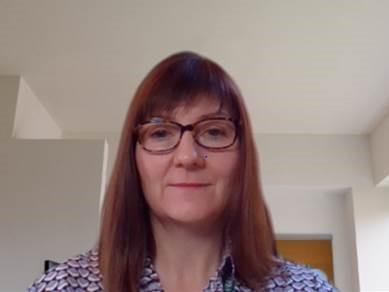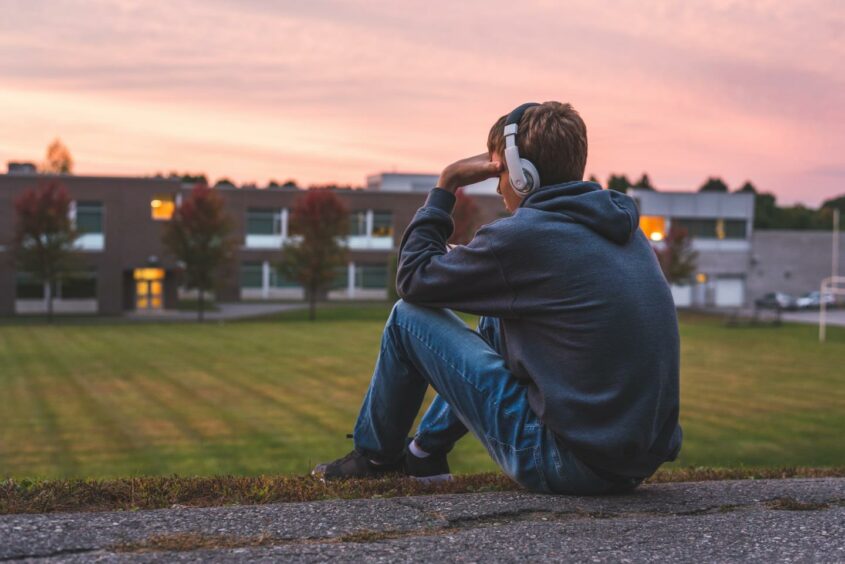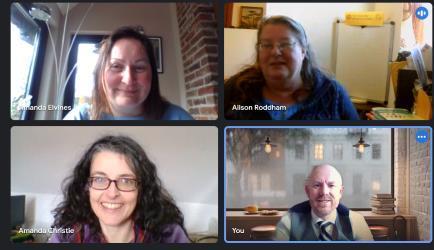Highland Virtual Academy is in uncharted territory.
The online teaching experiment is the first of its kind in Scotland – and it’s delivering astounding results.
The academy started out six years ago as an experiment, with 10 pupils who wanted to study German.
From there, it has grown into an online school with around 100 pupils from across Highland, and an expanding curriculum.
Beyond that, it has proved a lifeline for kids who can’t attend school.
For those pupils, Highland Virtual Academy delivers education, independence, support and self-esteem.
“We try to be as flexible as we can to meet the needs of our young people,” explains head teacher Laura Gordon.
“Our goal is to provide a nurturing environment to bring the young people on. We hope we’re getting that right.”
School back up plan
Some pupils spoke to us about their experiences – via Google Meet, of course.
Their cameras were switched off (they are teenagers after all) but they were switched on. And articulate.
“My school referred me to the Highland Virtual Academy and I wouldn’t change it for the world,” says Caysie*.
“I dropped out of school in S2 to do home schooling because I found school really affected my mental health,” she says.
“I lost my sister a couple of years ago so that also affected my mental health greatly, and I was constantly getting bullied. Because I’m English I had a lot of racism as well. So I found school wasn’t really something for me.”
Caysie is under police protection, and wanted to stay at home with her family. However, she also wanted qualifications. This is where the academy stepped in.
Not being in school has improved my mental health so much.”
“Not being in school has improved my mental health so much,” she says. “It’s something that has really helped me.”
Caysie is now in S4 and studying rural skills, maths, English, business, personal development and French. She hopes to enrol in an online college course to study psychology.
“Mental health issues run throughout my whole family so that’s one reason I’m interested in psychology, but just in general I want to delve deeper into mental processes and behaviours,” she says.
‘It’s been a bit of a godsend’
Derek Newlands, the academy’s principal teacher for guidance, estimates that about 75% of pupils classed as ‘non-attenders” can’t attend school at all. Others do blended learning.
“The need is there because there’s an increasing number of pupils who are unable to attend school,” says Derek.
“During Covid it would have been pupils who were shielding. There’s also an increase in school-based anxiety, social anxiety and mental health problems and these have all been exacerbated by the pandemic. There are family issues that prevent young people from attending school too.
“So it’s quite a complex and varied field of problems that are stopping pupils from accessing education.”
The emphasis here is on can’t, adds Derek. “Quite a lot of our pupils would like to go to school but they’re just not able to cross the threshold.”
That’s a familiar situation for Sharon Strachan, whose daughter Katie attends the academy.
“We went through a long time of getting dressed and ready to go every single day and sitting in the car park every single day,” she says.
For Katie, crippling anxiety prevented her from attending school at Millburn Academy.
Her Mum asked for a referral to the Virtual Academy.
“It’s relatively new to her but it’s all very positive so far,” says Sharon.
“Katie’s confidence has grown. She’s able to now join classes – she’s come very far from where she was.
“The Virtual Academy has been a bit of a godsend to be honest.”
Covid was a game changer
It poses the question: would these pupils have remained ‘lost’ without the pandemic?
The academy existed before Covid, as a means of accessing a wider subject range across Highland. But it was the pandemic that crystallised its potential for non-attenders.
“Covid changed the path through school,” says Derek.
Take S4 pupil Sophie* for example. “After Covid I couldn’t really go into school because of mental problems and social anxiety,” she says. “I haven’t been to school since 2020.
“Before Covid, I was pretty fine at school… I think lockdown exacerbated previous mental problems. I had a bit of anxiety before but after it was really bad.”
Sophie joined the academy last September and is now studying for her National 5s in English, maths, psychology, fashion and textiles. She hopes to go on to college next year.
Sophie and her peers at the academy say virtual learning has allowed them to access an education they might otherwise have missed.
“The school environment was very stressful for me, so being able to do it from home is very helpful,” she says.
Back to the real world
Is there a danger that pupils could get so accustomed to online life that they can’t return to the ‘real’ world?
Derek said: “Quite often when anxiety is based around school, young people can shoe box that.”
He shares the story of one pupil, who could only attend school if a pupil support assistant accompanied them to class. Eventually, they stopped going altogether.
To Derek’s surprise, that same pupil is now attending college with no support.
When Derek asked the pupil why they can attend college but not school, they simply said, “That was school”.
“It’s not uncommon for our young people to be quite isolated, and we try to pair people up to help them out of their shell,” says Derek. “It’s a stepping stone towards facing up to real world anxiety.”
Indeed, Caysie says that since joining Highland Virtual Academy she’s made new friends and has even joined the army cadets.
“It’s helped my social life,” she says, adding: “Before, I was lacked a lot in confidence and had a lot of self doubt.”
Open door approach
This goes to the core of the academy’s ethos. In the junior phase, the focus is on re-engaging pupils with their learning, building confidence with a view to returning to school.
By S4, the priority is helping pupils to attain qualifications. The senior phase results are impressive.
“Over the last five years, we’ve averaged a 95-96% pass rate in the senior phase, which is above the national average and higher than the Highland average,” says Laura. “Many of those pupils achieve the upper grades too.”
Admittedly, the approach is not for everyone, and some pupils only attend for a short while. Non-attenders work on a unit by unit basis as they can start at any time in the school year.
Pupils remain on their parent school roll, and can return at any time, with support. One such pupil is Chloe MacCaskill.
Chloe is studying for Highers in English and history, and National 5 maths. Because she’s type one diabetic, Chloe decided not to attend school during the pandemic. The academy meant she could continue her studies from the safety of her own home.
“I’ve got a good routine now and I’ve had a lot of support from my teachers, which has helped,” she says. “Being able to meet with them every day has been really good.
“I’m going back to school for S6 to sit more Highers. I’m a bit nervous but think it will be fine.
“This was the best decision for me,” she adds.
No wrong path
While Chloe is returning to mainstream school, S5 pupil Daisy MacVicar is doing blended learning, mixing online lessons with time in the learning support department at Plockton Academy.
Daisy started experiencing anxiety in S1 and missed a lot of school. During the pandemic, she attended with the key worker pupils, preferring the quieter environment. She joined the academy last September.
“I really like the routine of it,” she says. “Every day there’s stuff to do so it gives me that bit of routine that I didn’t have for so long.”
“I can’t say enough how vital the academy is.”
For the parents, seeing their kids settled is a huge relief. Sophie’s Mum Jill* says the academy is “fantastic.”
“Sophie used to enjoy school,” says Jill. “She’s clever and she’s got competence, but she was very frustrated at not being able to achieve what she would have hoped to achieve previously.
“To not be able to engage with school at all because of her social anxiety was a really big stressor for her… she’s watching her peers achieve, and she’s not managing to do it.
“More and more children are impacted by social anxiety and mental health problems and can’t attend what is a very rigid school structure.
“I can’t say enough how vital the academy is.”
Derek hints to a more wholesale change in the nature of education itself. “Education is lifelong,” he says. “What we are offering here is an alternative route through school, rather than saying it’s not the right path.”
*Some names have been changed to protect pupils’ privacy.
More from the Schools & Family team
Ellon Academy reports highest Covid case rate to date
When should my child start doing chores? When they’re two, is the surprising answer from the experts
Ukraine: Island pupils lobby the government to help more refugees




